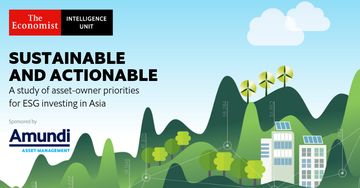Amundi and The Economist release a study of asset-owner priorities for ESG investing in Asia
Amundi and The Economist release an ESG Asian study, Wednesday 26 June 2019
ESG
Sustainable and actionable: a study of asset-owner priorities for ESG investing in Asia
The world’s top 100 asset owners (AOs) represent about US$19trn in assets under management. The largest, and potentially most influential, proportion is in Asia—more than a third of the total. Out of the top 20 largest funds, three out of the first five and nearly half of the total are in Asia.
How do asset owners in Asia approach that scale of responsibility?
Executive summary
The Economist Intelligence Unit carried out interviews with some of Asia’s largest asset owner firms, development banks, sustainable investment organisations and influential industry advocates to determine how they saw the growth of environmental, social and governance (ESG) investing in Asia, as well as the AO role in it. In parallel, we review the latest research on ESG investing in the region to give an overview of sustainable investing in Asia.
The main findings include:
- There has been a significant change in the awareness, uptake and impact of ESG in Asia over the past three to five years. This has been driven by: uptake by large asset owners such as Japan’s Government Pension Investment Fund (GPIF) and the Thai Government Pension Fund, which are not only transforming their own approach but proselytising among other investors in the region; the policies of national and multilateral development banks; and regulatory action by governments and exchanges.
- AOs are motivated by an increasing recognition that their investment decisions have material consequences for their environment and the lives of their beneficiaries. What’s more, there is growing awareness that integrating values or ethical considerations into investment approaches does not necessarily result in a negative impact on financial returns or performance. Rather, ESG is an integral component of prudent risk management.
- In terms of financial return, “governance” seems to be the most important ESG factor for most AOs, given its demonstrable link to optimising risk-adjusted returns. Capital allocation, in social and environmental themes, tends to be made within a framework of first identifying companies or assets that fit a good-governance profile and fulfil a returns-based role within portfolios. China is an exception, where a government focus on environmental issues has pushed this factor to the fore.
- As in other regions, ESG investing began with a negative screening approach. While the method is still used, the dominant ESG approaches are now engagement and, in particular, integration. Although commonly seen as late adopters, Asian AOs are applying this throughout their portfolios, rather than asset class by asset class.
- While progress is accelerating, challenges remain. Interviewees cited concerns about thin and poor-quality data preventing informed investment decisions; a fragmentary regulatory environment across the region, and a dragging perception in the broader market that ESG was about values (or ethics) rather than financial value (or returns). However, all participants agreed that these issues were being addressed and progress continues to be made.
